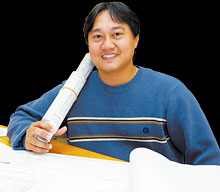Warning: include(/www/specials/filipino100/header.php): failed to open stream: No such file or directory in /srv/users/thaarchives/apps/thaarchives/public/specials/filipino100/cudiamat/index.php on line 1
Warning: include(): Failed opening '/www/specials/filipino100/header.php' for inclusion (include_path='.:/opt/sp/php7.4/lib/php') in /srv/users/thaarchives/apps/thaarchives/public/specials/filipino100/cudiamat/index.php on line 1
 |
 |
|
|
GREGORY YAMAMOTO | The Honolulu Advertiser |
|
|
| Birthplace: Honolulu
Family: Wife, Cheryl; children, 14-month-old Carson and newborn Tyson
First family member to live in Hawai'i: Either his paternal grandfather or a great-uncle
Occupation: Owner and chief executive officer of Structural Hawaii Inc.; president of the Honolulu Filipino Junior Chamber of Commerce
Hobbies: Basketball and volleyball, jamming on his 'ukulele or guitar, spending time with his family
Favorite Filipino dish: His mother's chicken adobo
|
|
|
|
|
|
|
By Catherine E. Toth
Advertiser Staff Writer
There was a time when Jeoffrey Cudiamat was ashamed of being Filipino. He hated when people made fun of the language, the accent, the little things that set Filipinos apart from other ethnic groups in Hawai'i.
Above all, he hated being judged by stereotypes.
"People would tease you, your accent. It scars you," said Cudiamat, 31, who grew up in Waipahu and now runs his own engineering company.
So he started to cultivate his own identity, one that didn't revolve around stereotypes — or his Filipino culture.
And that departure inevitably — and remarkably — led him right back.
"I realized that I wanted people to feel proud of being Filipino," he said, "and not say it with some reluctancy."
After graduating as valedictorian at Pearl City High School in 1992, Cudiamat went to study engineering at the University of Southern California, where nearly half of the student body was white.
Immediately, he felt the urge to find people he could connect with.
That led him to the school's Filipino club.
"In the beginning, I was just there to meet people I could relate to," said Cudiamat, who connected with the Hawai'i members in the club. "It was a lot of fun."
They organized Filipino cultural nights on campus, which showcased traditional songs and dances, all of which he had to learn.
The club fostered in Cudiamat a deeper appreciation for his Filipino heritage and how his culture had shaped who he was.
"It was totally different from anything I knew growing up," he said. "That really drove me to feel proud of being Filipino-American."
Cudiamat went on to help start a chapter of the first-ever Filipino-American fraternity in the U.S. — Zeta Phi Rho.
"I learned so much about what it means to be Filipino," he said. "Now I had no shame."
When Cudiamat graduated with honors from USC, he went to work as a project manager at PAMCO Contracting, his father's company. After other employment, he started his own business, Structural Hawaii Inc., nearly two years ago and now serves as president of the Honolulu Filipino Junior Chamber of Commerce.
"The Filipino youth now have a lot of role models to look up to who are at the forefront of defining society," he said.
Born and raised on O'ahu, Cudiamat said he actually identifies more with being local than being a Filipino-American.
He plays Hawaiian songs on his 'ukulele, plays pickup basketball and volleyball, and loves to just talk-story with his friends.
He's got the best of both worlds, he said.
"I have the upbringing and values of being Filipino. Those define my personality," he said. "But I was still brought up to be an American — with that aloha spirit."
He never learned how to speak Tagalog or Ilocano — both of which his immigrant parents spoke — or knew much about Filipino customs, though they were all around him.
But he does have fond memories growing up in a family of six.
Affectionately called "Nana's House," the two-story home in Pearl City where his grandparents lived was his family's gathering place. It was outfitted with items found in many Filipino homes: a portrait of the Last Supper, food offerings on an altar next to a statue of the Virgin Mary, and a large wooden spoon and fork on the kitchen wall.
Cudiamat lived there for years with his parents, three siblings, two aunties, two cousins and an uncle. Including his grandparents, there were at least 13 people in the house at any given time.
When the Cudiamats moved out, other family from the Philippines moved in, keeping the number of occupants hovering at a dozen.
New Year's, he said, was a big deal at Nana's House.
He remembered going to a farm in Nanakuli and watching the men wrestle pigs to the ground, tie up their feet, then stab them, letting the blood drain. Then they'd put the pigs into a hot bath while the kids — Cudiamat included — would help scrape the skin clean.
Those days, Cudiamat said, have come to define him.
"We all had a strong sense of family," said Cudiamat, who's married with two kids of his own.
"Like any other family, we had our disputes. But we always came back together."
Warning: include(/www/specials/filipino100/footer.php): failed to open stream: No such file or directory in /srv/users/thaarchives/apps/thaarchives/public/specials/filipino100/cudiamat/index.php on line 104
Warning: include(): Failed opening '/www/specials/filipino100/footer.php' for inclusion (include_path='.:/opt/sp/php7.4/lib/php') in /srv/users/thaarchives/apps/thaarchives/public/specials/filipino100/cudiamat/index.php on line 104

